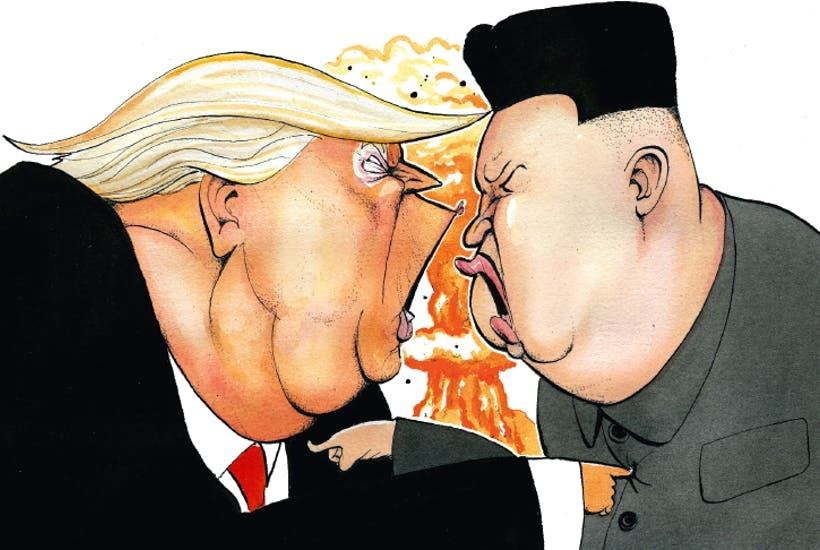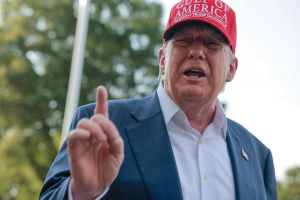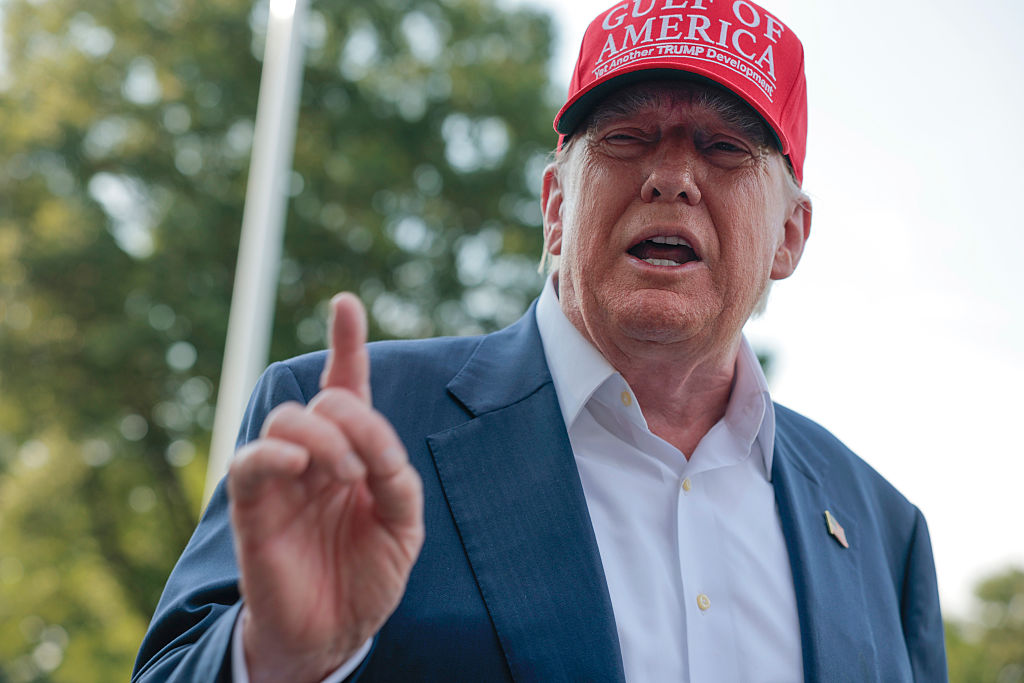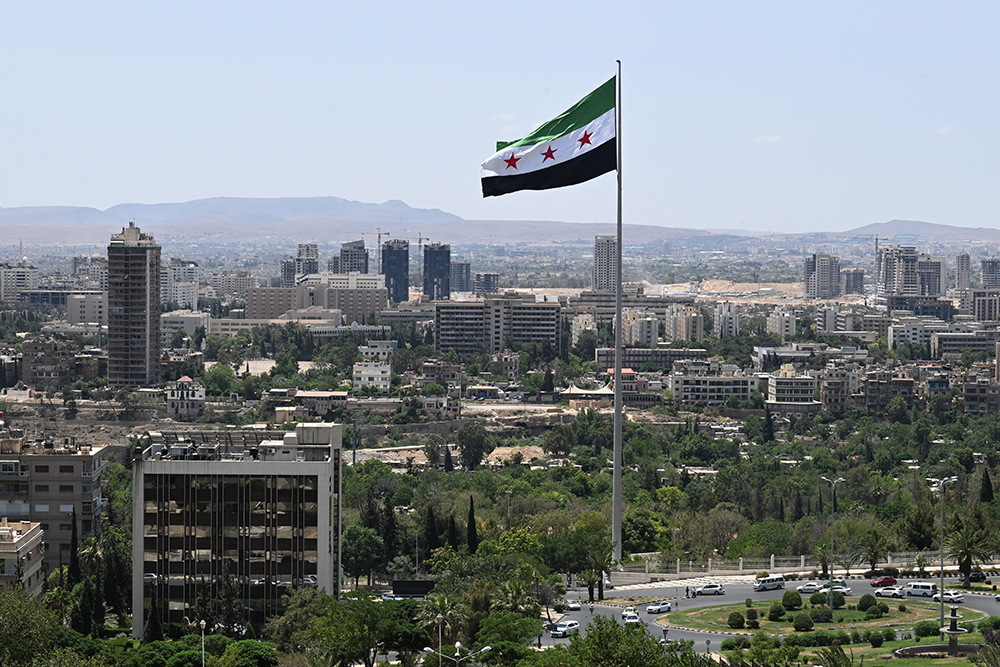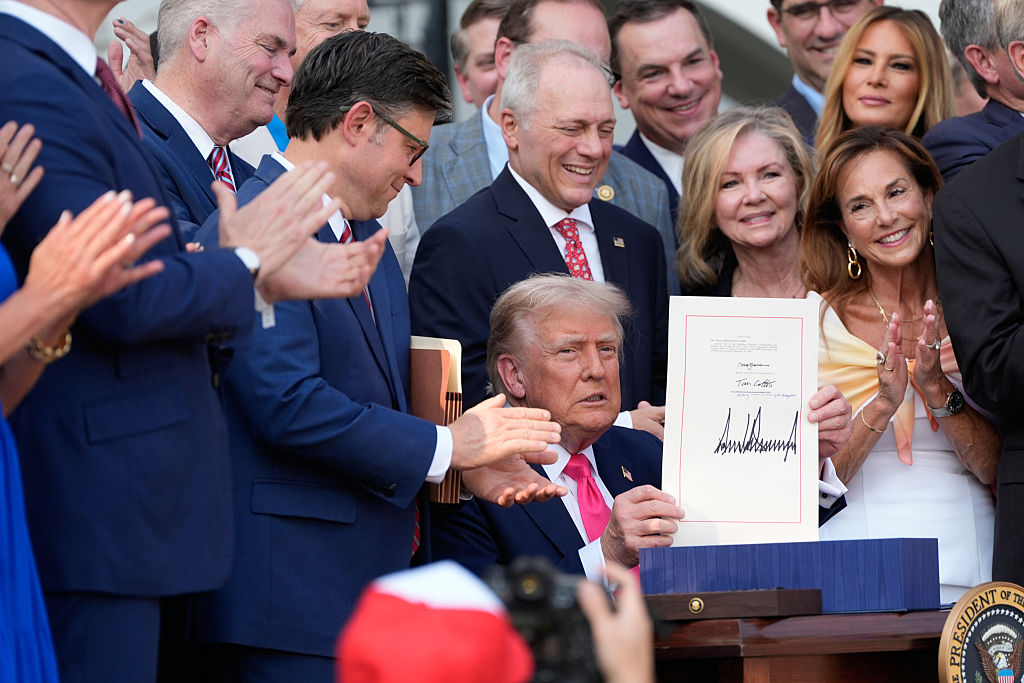Wednesday marked the 72nd anniversary of the dropping of the bomb on Nagasaki. The bombings of Hiroshima and Nagasaki prompted Emperor Hirohito to announce Japan’s surrender in a radio address, though fanatical war hawks tried to stop him. After 1945, Japan developed a pacifist movement and a so-called peace constitution. No country has deployed these fearsome weapons since.
Can it really be a coincidence that the day before this eerie anniversary, Donald Trump issued his implicit threat to unleash an unprecedentedly devastating nuclear attack on North Korea that would apparently eclipse Hiroshima and Nagasaki?
‘North Korea best not make any more threats to the United States,’ said the President. ‘They will be met with fire and fury like the world has never seen.’ Trump did not use the word ‘nuclear’, but his words curiously echoed those Harry Truman’s statement after the first atomic bomb was dropped. ‘It is a harnessing of the basic power of the universe,’ said Truman. ‘Behind this air attack will follow sea and land forces in such numbers and power as they have not yet seen.’
Nuclear weapons are the great taboo —or at least they have been since the second world war. Neither the Soviet Union nor China has ever used them in combat; nor have India or Pakistan. With Trump and Kim Jong-un, a bad hombre if ever there was one, now at loggerheads with each other, is that about to change?
Trump’s entourage says no. The old man, we are told, was in a lousy mood. Maybe he had a bad day on the links at Bedminster, where he issued his warning during a photo op at the Trump National Golf Club. Trump likes to generate world-shaking news while promoting his brand, and perhaps the ‘fire, fury and, frankly, power’ that he threatened to unleash on Pyongyang really was meant for his 7-iron.
The reaction in Washington, from both Republicans and Democrats, has not been favourable. Senator John McCain said, ‘I take exception to the President’s comments, because you’ve got to be sure that you can do what you say you’re going to do.’ Trump’s defenders pointed out that if John McCain had won his bid for the presidency in 2008, America would probably have ended up in a war with Russia over Georgia, since McCain’s international outlook is fundamentally more hawkish than the current President’s.
Still, plenty of other conservative institutions are concerned that Trump’s bellicosity towards North Korea is not backed up by coherent thinking or strategy. The Heritage Foundation, the citadel of conservatism in Washington, has suggested that Trump should employ more restrained language. And Democratic Senator Ben Cardin, who serves on the Foreign Relations Committee, notes that Trump’s flamboyant rhetoric sounds much like the kind of fulgurations that routinely emanate from Pyongyang.
Maybe Trump can successfully deploy what’s known as the ‘madman’ theory of international relations, in which a foreign adversary is supposed to believe that the US President is so bonkers that it’s best to come to terms. But what if Trump really is a madman? What if he really means it when he says that he’s ready to rain down ‘fire and fury’ upon North Korea, or at least convinces himself that it’s a neat idea?
The problem with Trump’s remarks is that unless he really is preparing to back up his red line, then he is debasing the credibility of America’s nuclear forces. The great deterrent could stop deterring. Far from being cowed by Trump’s remarks, North Korea is talking about creating an ‘enveloping fire’ around American forces based in Guam. It’s likely to conduct another ICBM test this weekend. Kim Jong-un’s message is clear: anything crazy you can do, I can do crazier. Indeed, according to the Defense Intelligence Agency, North Korea has up to 60 nuclear bombs and can miniaturise a warhead. There is no beautiful wall that can be built to fence off America from North Korea.
Trump might be bluffing, but North Korea could take his cavalier statements seriously and strike first. Either way, at a moment when even Washington’s neocon hawks are counselling caution, it’s hard not to have a bad case of the collywobbles when it comes to the prospect of the irascible and volatile Trump trying to stare down the pariah of Pyongyang. Trump’s tweet on Wednesday, in which he said that ‘hopefully’ America will never use its nuclear power, scarcely offered reassurance.
Could Kim Jong-un be bluffing, too? The Supreme Leader is an even more ridiculous figure than the President — less powerful but more unhinged. Both he and Trump may simply be peacocking with their military might in order to make themselves look and feel strong. North Korea has long been a bogeyman in the east; but if it were really an ‘existential threat’ or a ‘regional psychopath’, as we’ve so often been told, surely it would have caused another war by now? So far at least, however, the antipathy between the West and Pyongyang never amounts to much beyond dramatic threats and ominous weapons tests. Perhaps North Korea and Team Trump both understand that the great power game is as much about theatre as action. Kim and Trump can beat their chests at each other but war does not have to follow.
Another possibility is that Trump’s sabre-rattling towards North Korea is less his juvenile machismo, more the doing of the so-called ‘grown-ups’ in the Trump administration. When National Security Adviser H.R. McMaster joined the White House in February, replacing the wildly irresponsible Mike Flynn, the foreign-policy establishment expressed relief. Here at least was a man of substance at the heart of America’s strategic thinking, an antidote to the attention–deficient Commander-in-Chief. But McMaster is a general, and military men tend to think of military solutions. It was soon after McMaster entered the White House that Trump began ratcheting up his rhetoric towards North Korea. The idea then was clearly to pressure China. ‘If China is not going to solve North Korea,’ Trump said in early April. ‘We will.’
Days after that threat, Trump dropped the MOAB (‘Mother Of All Bombs’) on Isis tunnel networks in Afghanistan, an anti-terror strike that also seemed perfectly designed to show Beijing and Pyongyang that the new American President was not a man with whom they should trifle. H.R, McMaster’s influence within the administration appears to have grown in recent days, following the appointment of another general, John F. Kelly, as White House Chief of Staff. Kelly almost immediately supported the firing of Ezra Cohen-Watnick, a Trump loyalist on the National Security Council — a move that McMaster had long pushed for. It’s possible, then, that it is the generals McMaster and Kelly, now at the heart of American executive power, who have convinced the President to be ever more bellicose towards North Korea. Just last week McMaster suggested that ‘all options’ were on the table with regard to Pyongyang.
What’s certain is that the Trump administration has China, the great rival to American hegemony, in its strategic sights. Communist China’s only treaty alliance is with communist North Korea. That’s where Bill Clinton, George W. Bush and Barack Obama — who all tried to control the dangerous Pyongyang regime — fell short. Any showdown with North Korea would have meant confronting China, and that was not a risk worth taking. The Trump administration is eager to show Beijing that it is more resolute; that for all China’s expanding wealth and power, it does not have the final say over what happens even in its sphere of influence.
It is a far more risky approach, given the nuclear stakes involved, but it appears to be working. At the United Nations last weekend, China’s delegate voted for increased sanctions on North Korea; and the same day as Trump issued his fire and fury threat, the foreign minister of the People’s Republic confirmed that China was willing to ‘pay the price’ of fully implementing controls on its troublesome ally. China appears to be listening to the message Trump is sending. Certainly, he had made it clear enough on Twitter. ‘I am very disappointed in China,’ he tweeted at the end of last month. ‘Our foolish past leaders have allowed them to make hundreds of billions of dollars a year in trade, yet they do nothing for us with North Korea, just talk. We will no longer allow this to continue. China could easily solve this problem!’
Now, rather than accept that China has done something with its move towards sanctions, Trump has doubled down, going so far as to raise the possibility of nuclear war. If it isn’t just bravado, Trump’s intention might have been to ensure that China now enforces the sanctions it has supported, instead of reneging on them as it has on previous occasions. Where other leaders might have gratefully accepted an agreement, Trump is twisting China’s arm.
It could work, but China is unlikely to support any move that would actually bring about regime change in Pyongyang, since that could mean civil war and a refugee crisis on its border. Have the ‘grown-ups’ in Washington thought through all the consequences of bringing down Kim Jong-un? Their predecessors never did with Saddam Hussein. Trump’s madman approach to foreign policy may bring about quick wins — nobody wants to mess with a leader who might do anything at any point, especially when he has easily the most powerful military of all time at his disposal. But Kim Jong-un is mad, too; or at least he does a better impression of being a lunatic than Donald Trump. If this is a high-stakes game of chicken, who will be first to turn aside? In trying to teach China a lesson, Trump may find himself facing a disaster he cannot control.
Spectator.co.uk/podcast
Jacob Heilbrunn and Freddy Gray discuss the escalating war of words.



